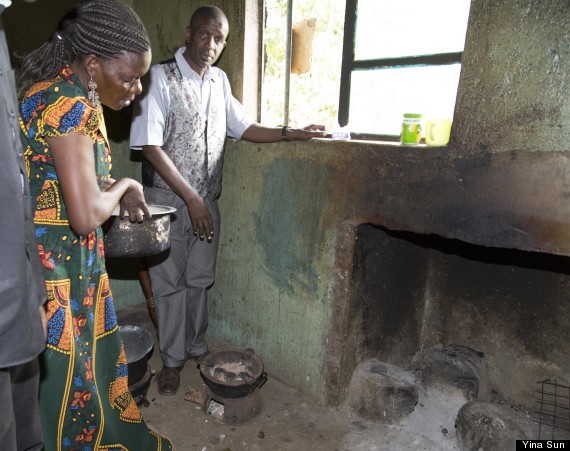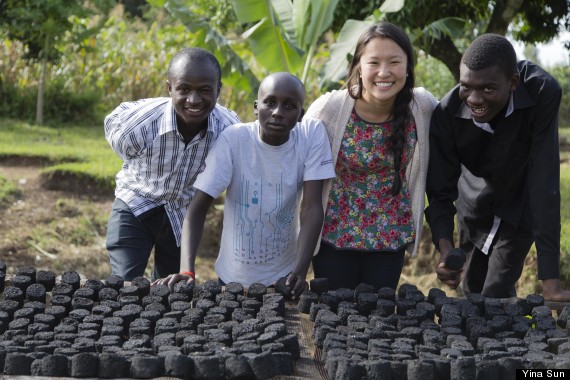When I became the Chief Operating Officer of a startup in Kenya this summer, my path in life transitioned from taking premed classes at school to exploiting the internet, teaching myself business skills on the go, and awkwardly interviewing potential employees twice my age.
I traveled to Kenya this past summer to intern for a non-profit called Innovate Kenya (IK). During my first week there, I attended an MIT hackathon event in Nairobi on behalf of IK with Tom Osborn: IK's 2013 winner and the 18-year-old founder/CEO of GreenChar. However, when Tom arrived three hours late to the event, my jet-lagged and over-caffeinated self kicked my Type-A personality into full gear; I snapped at Tom, berating him for being irresponsible and for not representing IK well. He just stared at me, slightly amused, slightly confused. I would later learn that Kenyans tend to be late -- it's really no big deal.
Over the course of the week, Tom and I became better friends, and he told me about his baby, GreenChar, which he founded in high school with his friends. GreenChar was working to transform the lives of the 90 percent of Kenyans who use charcoal or firewood to cook. By producing affordable and smokeless charcoal briquettes made from recycled agricultural wastes, GreenChar was saving lives and curbing deforestation in Kenya.
Tom had asked for my input on GreenChar, and, after I told him that everything from his dysfunctional website to his disorganized business plan needed to be cleaned up, he eventually asked me to become GreenChar's Chief Operating Officer. I was excited about the opportunity, but I told him the truth: I thought charcoal was boring and felt unexcited about GreenChar's mission. I had never seen anyone use charcoal to cook. I had never even thought about how other people cooked. How was I supposed to feel passionate about something that I didn't understand?
So Tom, the GreenChar team, and I decided to travel to his hometown, Awendo, where GreenChar was selling its charcoal briquettes. We squeezed ourselves in a van and drove six hours out of Nairobi. In retrospect, driving in a van at night with a group of boys I'd only know for two weeks, in land far away from home, might not have been a good idea. Still, it was a chance for me to see and understand what it meant to cook with firewood and charcoal everyday.
In Awendo, we were invited to Tom's home for lunch. The family's kitchen was the size of a pantry with a hole knocked into the wall where they would burn the firewood and charcoal. I saw Tom's mother bent over the burning firewood and pot, and I saw the smoke blowing into her face. This smoke would eventually fill the room. Tom's mom was unfazed as she continued preparing her fish. She was unfazed because this was her life: this was three meals every day, and it had been from the time she was born.
In Awendo, GreenChar began to matter to me. From standing in a smoke filled room, to meeting Linnett, the woman who produces the charcoal briquettes, to seeing GreenChar charcoal briquettes being sold at shops downtown, GreenChar became very real to me. I realized that each of the 4000kg of briquettes GreenChar has sold has really impacted someone's life.

Weeks after my trip to Awendo, I read an article on how 4.3 million people die every year from ongoing inhalation of smoke, more deaths than malaria, HIV/AIDS, and tuberculosis combined. The articled declared smoke as one of the world's greatest health risks, behind only high blood pressure, tobacco, and alcohol.
I began to realize that it didn't matter that we were 19-year-olds or that we lacked the experience of Wall Street executives. What mattered was that Kenya was losing forest cover and valuable members of its communities due to a problem for which GreenChar already had a solution. With thousands of briquettes already sold, a successful distribution channel, continuous publicity and recognition, and funding totaling over $90,000, GreenChar is well positioned and supported to transform Kenya's cooking environment.
I used to believe that each profession had sole, specific purposes: doctors save lives, businesses make money, lawyers handle laws. I thought that these purposes did not intermingle and were designated only to one profession, and I believed that there were specific paths to fulfill each of these purposes. However, through GreenChar, I realized that there are options-there are multiple paths to a destination, and these destination are often interconnected. Through something as simple as charcoal briquettes, GreenChar addresses health and environmentalism problems and works on women empowerment. My jobs change from day to day, ranging from working on budgets and financial projections, to learning about how to write contracts, to setting strategies for GreenChar's growth.
I want this blog to connect and support individuals who have a vision for the world and who may or may not be taking a less prescribed path to their goals. Through working with Innovate Kenya and GreenChar, I know success and impact can lie even in the most unusual paths, and young people have the huge potential to become the movers and shakers of the world. It is my hope that anyone who is interested and passionate about creating impact will join me in building a platform that connects and supports young and motivated people who want to change the world.
